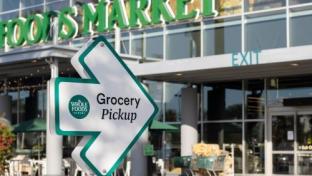08/07/2001
PepsiCo to Make Several Organization Changes Following Merger With Quaker
PepsiCo today announced several organization changes designed to help the company gain the full benefit of its recently completed merger with The Quaker Oats Company.
"One of the most exciting things about merging two outstanding companies like PepsiCo and Quaker is that we can do far more together than either company could on its own," said PepsiCo Chairman and CEO Steve Reinemund. "These changes will enable us to use our combined strength to the greatest
advantage."
"Some of the changes will allow us to do things more efficiently and at a lower cost by joining forces," Reinemund said. "Others facilitate sharing our intellectual capital -- the knowledge and expertise of our
businesses and people, so we can be more competitive in the marketplace."
The changes include:
-- A major benefit of the merger is the opportunity to use Quaker's large, efficient broker/warehouse system to expand distribution of Tropicana's products. To facilitate that, Tropicana will report in through Bob Morrison, 59, Quaker Chairman, President and CEO and Vice Chairman of PepsiCo, who will also oversee Gatorade and Quaker food operations and distribution in North America (U.S. and Canada). Tropicana will continue to be headquartered in Bradenton, Florida and led by President and CEO Brock Leach.
-- Pepsi-Cola International, Tropicana International and Gatorade International will make up a new division called PepsiCo Beverages International (PBI). PBI will be led by President and CEO Peter M. Thompson, who has been president and CEO of Pepsi-Cola International since 1996. PBI will be based in Purchase, N.Y.
-- A new division called Frito-Lay International will combine Frito-Lay Europe/Africa/Middle East, Frito-Lay Latin America/Asia Pacific/Australia and the Quaker snack and food businesses outside North America. Frito-Lay International will be led by President and CEO Rogelio Rebolledo, a 25-year PepsiCo executive and a principal architect of PepsiCo's international snack business. Rebolledo has been president and CEO of Frito-Lay Latin America/Asia Pacific/Australia since 2000 and previously led Frito-Lay Latin America/Asia Pacific. Michael White will continue in the key role as president and CEO of Frito-Lay Europe/Africa/Middle East, with additional responsibility for Quaker Foods Europe. Frito-Lay International will be based in Plano, Texas.
-- A new unit will be formed within Frito-Lay North America (FLNA) that will be dedicated exclusively to "convenience food" -- including non-core salty snacks (snack kits, meat snacks, etc.) and Quaker snacks (grain and cereal bars, rice snacks, etc.) It will report to FLNA President and CEO Al Bru, a 25-year PepsiCo veteran.
-- Management of "hot fill" beverage production and co-packing for Gatorade and Tropicana will be consolidated at Quaker in Chicago under Bob Morrison. In addition, contract packing of hot fill products will be jointly managed by Quaker and Pepsi-Cola North America. These steps will enable PepsiCo to manufacture Gatorade, Tropicana Twister, Dole, Season's Best, SoBe and other hot fill products more efficiently and at a lower cost. With the addition of Gatorade, PepsiCo now has the largest hot-fill manufacturing capacity of any beverage company in the world.
-- The coordination and consolidation of strategic materials purchasing across PepsiCo divisions will be expanded to include the Quaker businesses. That function will report to Bob Morrison in his role as PepsiCo vice chairman. Under this process, one division purchasing executive is responsible for buying a certain category of materials (i.e. "bottles and closures" or "paperboard and corrugated") for multiple divisions.
PepsiCo completed its merger with Quaker on Thursday Aug. 2 to form a company sharply focused on convenient foods and beverages. With pro-forma revenues of about $25 billion, PepsiCo today ranks as the world's fifth largest food and beverage company in revenues.
"One of the most exciting things about merging two outstanding companies like PepsiCo and Quaker is that we can do far more together than either company could on its own," said PepsiCo Chairman and CEO Steve Reinemund. "These changes will enable us to use our combined strength to the greatest
advantage."
"Some of the changes will allow us to do things more efficiently and at a lower cost by joining forces," Reinemund said. "Others facilitate sharing our intellectual capital -- the knowledge and expertise of our
businesses and people, so we can be more competitive in the marketplace."
The changes include:
-- A major benefit of the merger is the opportunity to use Quaker's large, efficient broker/warehouse system to expand distribution of Tropicana's products. To facilitate that, Tropicana will report in through Bob Morrison, 59, Quaker Chairman, President and CEO and Vice Chairman of PepsiCo, who will also oversee Gatorade and Quaker food operations and distribution in North America (U.S. and Canada). Tropicana will continue to be headquartered in Bradenton, Florida and led by President and CEO Brock Leach.
-- Pepsi-Cola International, Tropicana International and Gatorade International will make up a new division called PepsiCo Beverages International (PBI). PBI will be led by President and CEO Peter M. Thompson, who has been president and CEO of Pepsi-Cola International since 1996. PBI will be based in Purchase, N.Y.
-- A new division called Frito-Lay International will combine Frito-Lay Europe/Africa/Middle East, Frito-Lay Latin America/Asia Pacific/Australia and the Quaker snack and food businesses outside North America. Frito-Lay International will be led by President and CEO Rogelio Rebolledo, a 25-year PepsiCo executive and a principal architect of PepsiCo's international snack business. Rebolledo has been president and CEO of Frito-Lay Latin America/Asia Pacific/Australia since 2000 and previously led Frito-Lay Latin America/Asia Pacific. Michael White will continue in the key role as president and CEO of Frito-Lay Europe/Africa/Middle East, with additional responsibility for Quaker Foods Europe. Frito-Lay International will be based in Plano, Texas.
-- A new unit will be formed within Frito-Lay North America (FLNA) that will be dedicated exclusively to "convenience food" -- including non-core salty snacks (snack kits, meat snacks, etc.) and Quaker snacks (grain and cereal bars, rice snacks, etc.) It will report to FLNA President and CEO Al Bru, a 25-year PepsiCo veteran.
-- Management of "hot fill" beverage production and co-packing for Gatorade and Tropicana will be consolidated at Quaker in Chicago under Bob Morrison. In addition, contract packing of hot fill products will be jointly managed by Quaker and Pepsi-Cola North America. These steps will enable PepsiCo to manufacture Gatorade, Tropicana Twister, Dole, Season's Best, SoBe and other hot fill products more efficiently and at a lower cost. With the addition of Gatorade, PepsiCo now has the largest hot-fill manufacturing capacity of any beverage company in the world.
-- The coordination and consolidation of strategic materials purchasing across PepsiCo divisions will be expanded to include the Quaker businesses. That function will report to Bob Morrison in his role as PepsiCo vice chairman. Under this process, one division purchasing executive is responsible for buying a certain category of materials (i.e. "bottles and closures" or "paperboard and corrugated") for multiple divisions.
PepsiCo completed its merger with Quaker on Thursday Aug. 2 to form a company sharply focused on convenient foods and beverages. With pro-forma revenues of about $25 billion, PepsiCo today ranks as the world's fifth largest food and beverage company in revenues.


